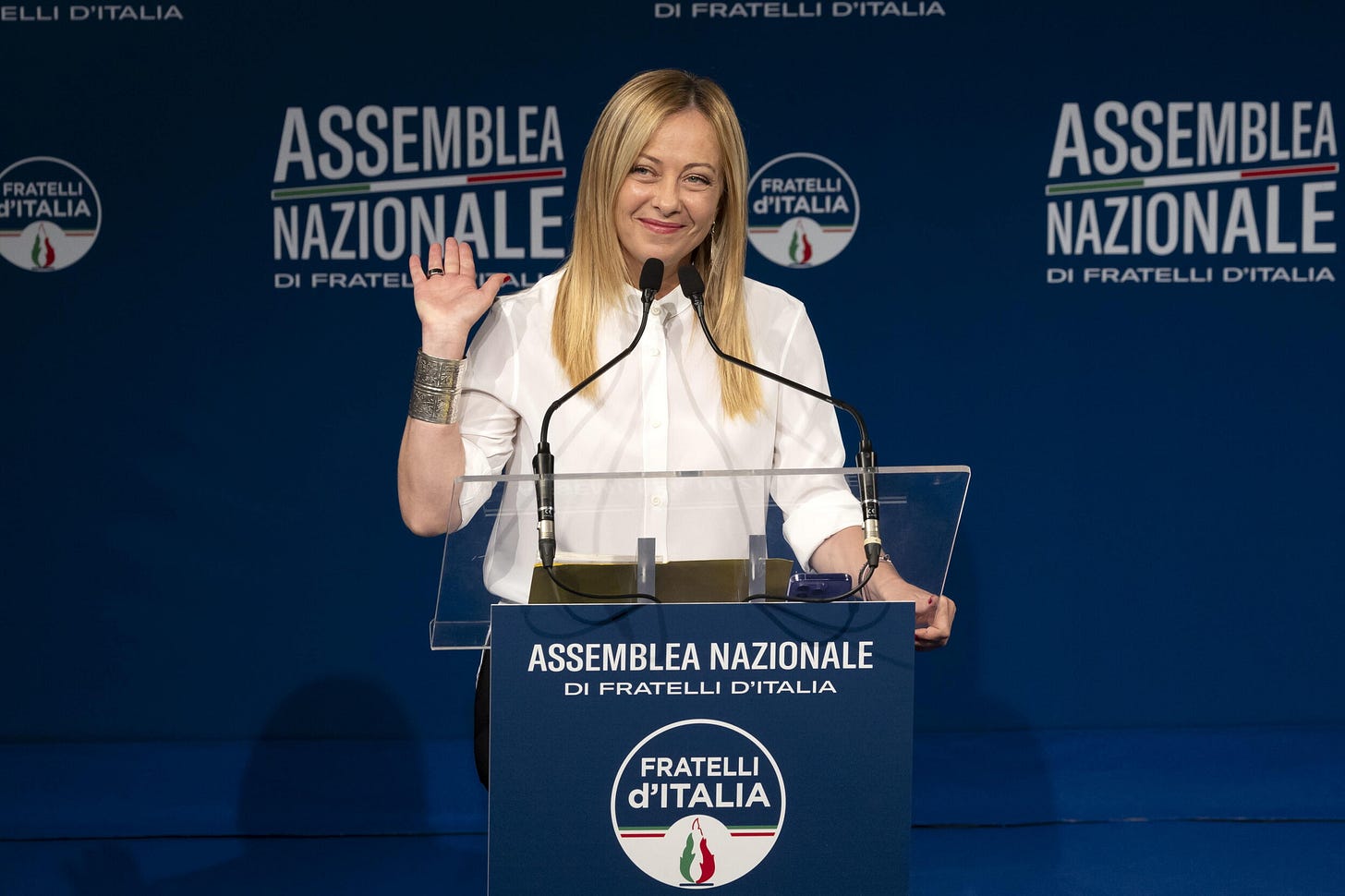In an interview with right-wing newspaper Il giornale over the weekend, Giorgia Meloni celebrated the anniversary of her government’s first year in power by offering a particularly hyperbolic soundbite: “finally, once again, Italy is a protagonist on the world stage!” It was hard not to snigger. Firstly because this is so obviously a gross exaggeration. But secondly because the real purpose - namely to distract from her many domestic shortcomings - was so blatant. For the last twelve months Meloni’s government has achieved… very little. Instead, what we’ve seen, again and again is a pattern of populist posturing. The government announces a dramatic policy, grabs some headlines, moves the proposal to a decree phase, and lets it die after 60 days. It started with the long-mooted naval blockade and drive to reduce the use of English in politics. We saw it again this summer with the budget airline price cap and the windfall tax. All, without exception, died virtually as soon as they were announced. Yes, the administration has delivered some worrying social policies on surrogacy and migration. But even here, judges are stepping in to limit the damage. International media are still fixated on the relatively superficial question of whether and to what extent Meloni is a ‘fascist.’ The reality, on the ground, feels much like the Berlusconi years. Inflation is rising along with living costs. Pension and tax reforms are being booted down the playing field while the government quietly chops away at what remains of the welfare state. The culture war may be more violent than ever, but to me Italy feels mainly like it’s stuck in 2008 all over again, unable to find a credible path for the future.

A few years ago - more years than I’d like to admit - I wrote a piece for VICE magazine about the Neapolitan subculture known as ‘musica neomelodica’. For those unfamiliar with the genre, neomelodica is a south Italian, working class music which combines elements of traditional Partenopeo folk with elements of disco and synth pop. It’s big business. There are neomelodica TV channels, record labels, festivals and merchandise. Despite the crisis, record sales are apparently still booming. Well, this week the musica neomelodica world was hit by a scandal when one of the biggest stars in the scene, Tony Colombo, was arrested on suspicion of being involved with the Di Lauro mafia clan (one of the most dangerous and notorious factions of the Cammora). I say “hit by”, but in a sense this isn’t a surprise. It’s no secret that several neomelodici have links to organised crime. Many have actually spent time behind bars, and the lyrics frequently evoke criminality and gang culture. Several of the country’s big mafia bosses are known to be fans of the genre. What makes the Colombo case so interesting is his relative fame, and how deeply he seems to be implicated. According to reports Colombo and his associates were involved not only in “aiding” the Camorra but were also complicit in tobacco smuggling and even election rigging. Specific details are still under wraps, but we do know that the police sized 8 million euros of assets during these latest raids. Good news for justice, sure. But many still see this as a witch-hunt against a self-made man; an opportunistic swipe on the part of authorities at those who are “simply” hustling.
The local government in Milan has just announced new measures to regulate nightlife in the Melza, Lazzaretto and Porta Venezia neighbourhoods, and the response has been mixed to say the least. According to the regulations, which will come into effect immediately, vendors are prohibited from selling any kind of food or drink (alcoholic or otherwise) between 1:30-6:00am on Friday and Saturday nights. All itinerant activities - e.g. parades, marches, protests - will also be forbidden during the same time-window. The municipality states that it’s acting to protect residents, which is fair enough I think (while ‘unsexy’ it’s a more important subject than some seem ready to acknowledge). Still, I have to say the approach seems off. Where, for example, will revellers go? The answer - presumably - is to other, less affluent, parts of the city where they can promptly become “someone else’s problem.” Likewise, how many raves or protests or whatever really take place at 2.00am on a weekend in Milan? Not as many as I’d like to see, honestly! Now, I’m not saying that people should have a free licence to make a total mess (trust me, having lived in Palermo’s Kalsa district above a bar with its own resident Guns n Roses tribute band I know how annoying late night noise can be). Still, the top down nature of this decision, the lack of holistic vision, and the absence of civic participation is sad to see. Perhaps the municipality could consider a citizens’ assembly or something next time? Just a thought…
Arts and culture: Outsider Art
The author and renowned ITA-ENG translator Jhumpa Lahiri has got a new collection of short fiction out and it’s probably the best-reviewed Italy-based book of the year so far. Roman Stories is comprised of nine short prose pieces; all set in the Italian capital and all centring around unnamed protagonists who are in some way ‘outsiders.’ Anyone familiar with Lahiri’s work - and particularly her 2018 novel Whereabouts - will know how beautifully she writes about place, emotion and belonging. Lahiri’s new collection builds on that groundwork but here she offers a more complex, darker take on Italian life. Rome is still romantic, elegant, vibrant, but it’s also fragmented, vulgar, hostile. The stories are noticeably more engaged with politics and sociology too. Take ‘The Boundary’, which centres on a young girl whose family is forced to move to the countryside after her immigrant father is beaten up in a racist incident. Or ‘Well-Lit House’ which follows a refugee who tries and fails to maintain his dignity and his dream of building a peaceful life due to the behaviour of some seriously unpleasant neighbours. This is a more journalistic offering from Lahiri, yes, but it still reads beautifully and it’s interesting to see how she’s growing as a writer to confront our inescapable poly-crisis. Order straight from the publisher here
Over the past few months the Congolese stand-up Nathan Kiboba has been gaining some serious recognition on the Italian comedy scene, and I highly recommend you check his stuff out to get-up to speed. Because Kiboba’s success is kind of miraculous. After all, Italian is his second language. He speaks well, but not perfectly. His delivery is stuttered, a little uncertain and sometimes filled with serious errors. And yet, despite - or perhaps because of this - his jokes just work. His topics are pretty standard (racism, migration, working culture, stereotypes, food) but he has a good knack of balancing bitter and sometimes politically incorrect rants with irony and deprecating asides. He has decent stage presence. He skilfully confronts taboos; avoiding the temptation to pander to the ‘woke’ or ‘anti-woke’ brigades. Watching him, it’s clear he’s still finding his feet. But his voice, his experience of Italianness, his sheer linguistic bravery is compelling, engaging and, most importantly, funny to watch. As the tagline to his latest live show well-captures. “Black Friday: In Nero, come la Maggiore parte del lavoro in quest paese.” [Black Friday: on the black, like most of the work in this country]. Bravo.
Recipe of the week: Scampi risotto
The writer Ernest Hemingway is said to have developed a taste for this dish during his many sojourns in and around Venice’s Piazza San Marco. Frankly, it’s a bit of a faff to make. Aside from the usual risotto stuff you’ve got to make a stock and a bisque from crustacean shells, whisk cream into a broth without it curdling and do all of this without overcooking your scampi. One for more cheffy readers, then, but certainly worth preparing if you’ve got several hours to spare over the weekend. There are plenty of recipes for scampi risotto floating around the internet, but few are really worth your time. The best I’ve found, in English, and available online, is this one by Ilaria Barisi which is apparently based on instructions from Marco Claroni, head chef at the Osteria dell’orologio in Rome. Personally (if I may) I’d offer one alteration to Mr. Claroni’s guidelines. I have it on good authority that Hemmingway used to add brandy to the rice rather than white wine. Decadent as it sounds I can tell you based on past experience that it really does make a difference, giving the dish almost stroganoff-esque depth. Aside from that, you can’t go wrong following Claroni’s guidelines — and the hard work is totally worth it. With a little patience you’ve got your perfect dish for date night or a dinner party.
About Me
My name is Jamie Mackay (@JacMackay) and I’m an author, editor and translator based in Florence. I’ve been writing about Italy for a decade for international media including The Guardian, The Economist, Frieze, and Art Review. I launched ‘The Week in Italy’ to share a more direct and regular overview of the debates and dilemmas, innovations and crises that sometimes pass under the radar of our overcrowded news feeds.
If you enjoyed this newsletter I hope you’ll consider becoming a supporter for EUR 5.00 per month (the price of a weekly catch-up over an espresso). Alternatively, if you’d like to send a one-off something, you can do so via PayPal using this link. No worries if you can’t chip-in or don’t feel like doing so, but please do consider forwarding this to a friend or two. It’s a big help!




